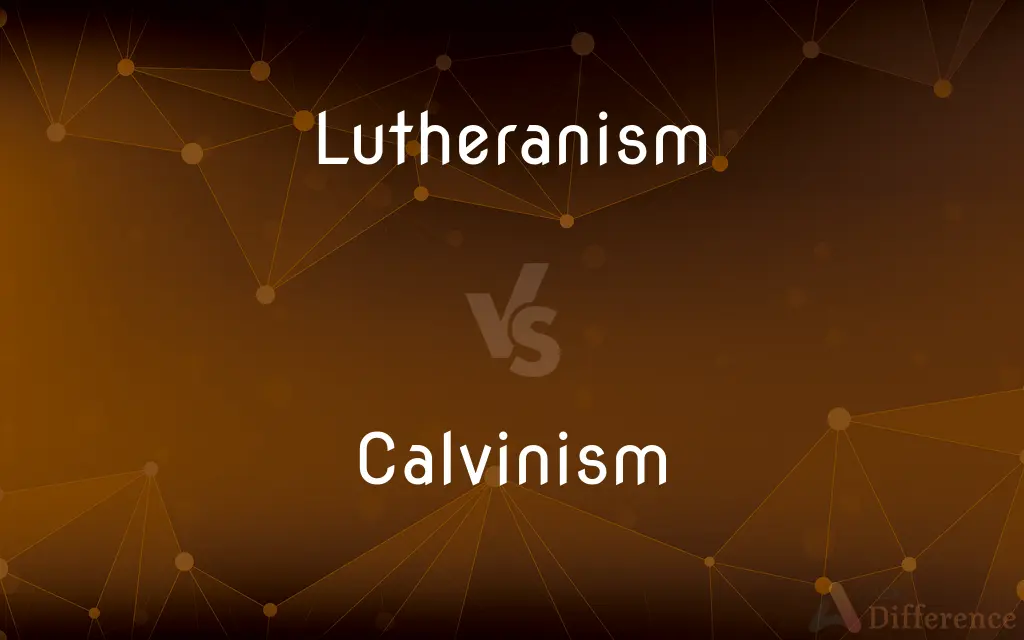Lutheranism vs. Calvinism — What's the Difference?
By Tayyaba Rehman — Updated on October 13, 2023
Lutheranism and Calvinism are both Protestant Christian movements, with Lutheranism focusing on faith alone for salvation and sacraments, while Calvinism emphasizes predestination and God's sovereignty.

Difference Between Lutheranism and Calvinism
Table of Contents
ADVERTISEMENT
Key Differences
Lutheranism and Calvinism, two major branches of Protestant Christianity, emerged during the Protestant Reformation in the 16th century. Lutheranism, founded by Martin Luther, holds that salvation is achieved through faith alone, without the need for good deeds. Calvinism, on the other hand, is rooted in the teachings of John Calvin, emphasizing the sovereignty of God and the doctrine of predestination.
Lutheranism traditionally emphasizes the importance of sacraments like baptism and the Eucharist. Calvinism, while not disregarding the sacraments, places a stronger emphasis on the Word of God and its preaching. Both movements sought to reform practices and beliefs of the Catholic Church, but they diverged in their interpretations and emphasis on certain theological points.
Calvinism is perhaps most well-known for its doctrine of predestination, the belief that God has predestined certain individuals for salvation and others for damnation. Lutheranism, while believing in God's predestination, focuses more on the universal possibility of salvation through Jesus Christ.
Despite their differences, both Lutheranism and Calvinism have contributed immensely to the Christian landscape, influencing theology, church practices, and even political structures in various parts of the world. Their theological discussions and disputes have shaped Protestant Christianity in profound ways.
Comparison Chart
Founder
Martin Luther
John Calvin
ADVERTISEMENT
Key Doctrine
Justification by faith alone
Predestination and God's sovereignty
Sacraments
Emphasizes baptism and Eucharist
Values Word of God and its preaching more
View on Predestination
Universal possibility of salvation through Jesus
Certain individuals predestined for salvation or damnation
Geographical Spread
Predominant in parts of Germany and Scandinavia
Influential in Switzerland, Scotland, and Netherlands
Compare with Definitions
Lutheranism
The belief in salvation through faith alone without the necessity of good deeds.
In Lutheranism, it's emphasized that faith alone grants salvation.
Calvinism
A Christian denomination rooted in the teachings of John Calvin.
Calvinism spread rapidly throughout parts of Europe in the 16th century.
Lutheranism
A movement that values the sacraments of baptism and the Eucharist.
Lutheranism holds the Eucharist in high regard, believing in the real presence of Christ.
Calvinism
A movement emphasizing the importance of scripture and the preaching of the Word of God.
Calvinism prioritizes scripture as the primary source of divine truth.
Lutheranism
The theological doctrines and church practices based on Martin Luther's teachings.
The Augsburg Confession is a key document outlining Lutheranism beliefs.
Calvinism
A branch of Protestantism influential in countries like Switzerland and Scotland.
Geneva, under John Calvin's leadership, became a hub for Calvinism.
Lutheranism
A branch of Protestantism primarily found in Germany and Scandinavia.
Lutheranism became the state religion in many German states.
Calvinism
The theological doctrines and ecclesiastical traditions based on John Calvin's teachings.
The Institutes of the Christian Religion is a seminal text explaining Calvinism.
Lutheranism
A Christian denomination stemming from the teachings of Martin Luther.
Lutheranism originated during the Protestant Reformation in the 16th century.
Calvinism
The belief in God's absolute sovereignty and the doctrine of predestination.
In Calvinism, God's will and predestination are central tenets.
Lutheranism
Lutheranism is one of the largest branches of Protestantism that identifies with the teachings of Jesus Christ and was founded by Martin Luther, a 16th-century German reformer whose efforts to reform the theology and practice of the church launched the Protestant Reformation. The reaction of the government and church authorities to the international spread of his writings, beginning with the 95 Theses, divided Western Christianity.
Calvinism
Calvinism (also called the Reformed tradition or Reformed Protestantism) is a major branch of Protestantism that follows the theological tradition and forms of Christian practice set down by John Calvin and other Reformation-era theologians. It emphasises the sovereignty of God and the authority of the Bible.
Lutheranism
Of or relating to the religious doctrines of Martin Luther, especially the doctrine of justification by faith alone.
Calvinism
The religious doctrines of John Calvin, emphasizing the omnipotence of God and the salvation of the elect by God's grace alone.
Lutheranism
Of or relating to the Protestant denomination adhering to these doctrines.
Calvinism
The theological tenets or doctrines of John Calvin (a French theologian and reformer of the 16th century) and his followers, or of the so-called calvinistic churches.
Lutheranism
A member of the Lutheran Church.
Calvinism
The theological system of John Calvin and his followers emphasizing omnipotence of God and salvation by grace alone
Lutheranism
The doctrines taught by Luther or held by the Lutheran Church.
Lutheranism
Teachings of Martin Luther emphasizing the cardinal doctrine of justification by faith alone
Common Curiosities
What is Lutheranism?
Lutheranism is a Protestant Christian denomination based on the teachings of Martin Luther.
Where did Lutheranism predominantly spread?
Lutheranism primarily spread in parts of Germany and Scandinavia.
How does Lutheranism view salvation?
Lutheranism believes salvation is through faith alone, without the need for good deeds.
Who founded Calvinism?
Calvinism was founded on the teachings of John Calvin.
Do both Lutheranism and Calvinism value sacraments?
Yes, but Lutheranism emphasizes sacraments like baptism and the Eucharist, while Calvinism emphasizes the Word of God and preaching.
What's a primary scripture for Calvinism?
"Institutes of the Christian Religion" is a foundational text for Calvinism.
How do Lutherans view predestination?
Lutherans believe in God's predestination but focus on the universal possibility of salvation through Jesus.
Are the teachings of Lutheranism and Calvinism similar to Catholicism?
While there are similarities, both have significant theological differences from Catholic beliefs.
Was Lutheranism established before Calvinism?
Yes, Lutheranism emerged slightly earlier during the Protestant Reformation than Calvinism.
Are there many denominations within Lutheranism and Calvinism?
Yes, both Lutheranism and Calvinism have various denominations and traditions within them.
What's a unique doctrine of Calvinism?
Calvinism is known for its doctrine of predestination and God's absolute sovereignty.
How do Lutheranism and Calvinism view the authority of the Pope?
Both reject the absolute authority of the Pope, emphasizing the primacy of the scripture.
Which countries were influenced by Calvinism?
Calvinism was influential in Switzerland, Scotland, and the Netherlands.
Do Lutherans have a catechism?
Yes, Lutherans have their catechisms, with "Luther's Small Catechism" being a foundational one.
Was John Calvin a contemporary of Martin Luther?
Yes, John Calvin and Martin Luther were contemporaries, but Calvin was younger and began his reforming work after Luther.
Share Your Discovery

Previous Comparison
Hyperbole vs. Metaphor
Next Comparison
Elf vs. FaeAuthor Spotlight
Written by
Tayyaba RehmanTayyaba Rehman is a distinguished writer, currently serving as a primary contributor to askdifference.com. As a researcher in semantics and etymology, Tayyaba's passion for the complexity of languages and their distinctions has found a perfect home on the platform. Tayyaba delves into the intricacies of language, distinguishing between commonly confused words and phrases, thereby providing clarity for readers worldwide.














































